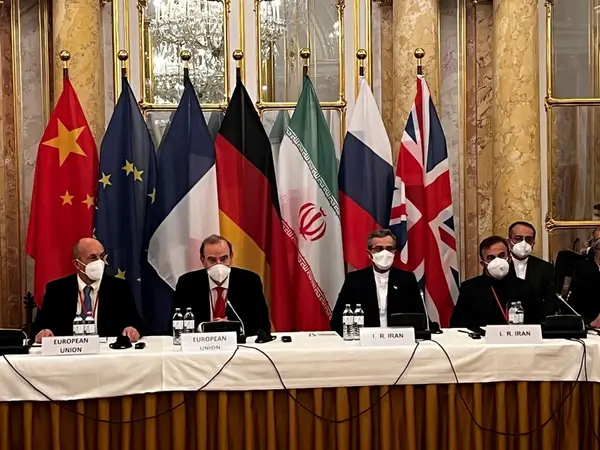Iran reiterated Monday that it would negotiate in Vienna only on the basis of its drafts sent to world powers, demanding first the removal of all sanctions.
Resumed nuclear talks last week ended on Friday without any success, prompting the United States and its European allies to express dismay. One official told reporters that Iran reneged on previous compromises and presented new demands.
“We are negotiating in Vienna on the basis of the [three] draft documents we have put forward on the lifting of sanctions and how to stop Iran’s remedial measures [expanding nuclear activities in response],” spokesman Saeed Khatibzadeh told reporters at his weekly press briefing Monday. Documents submitted to other parties, he explained, were based on the text of the JCPOA and on the previous six rounds of talks in Vienna, held before President Ebrahim Raisi (Raeesi) took office.
“There is basically no talk of anything as a step-by-step deal or interim plans,” Khatibzadeh added, referring to Iran's demands that post-2018 sanctions should be removed all at once.
Iran’s lead negotiator Ali Bagheri Kani in an interview broadcast by al-Jazeera television Saturday said that “any sanctions in violation and not consistent with the JCPOA should be removed immediately.” This included “all the sanctions imposed or re-imposed under the so-called ‘maximum pressure’ campaign of the US,” and that Iran would in turn return its nuclear program to the limits of the JCPOA, the Joint Comprehensive Plan of Action.
Raisi briefly referred to the nuclear issue in a televised talk Sunday, saying he was pursuing the "lifting of sanctions" based on proposals Iran had made to world powers.
One of the two main documents includes Iran's analysis of relevant sanctions while the second lists the steps Iran would take in return in scaling back aspects of the nuclear program it began expanding in 2019 after the US left the JCPOA in 2018 and imposed ‘maximum pressure’ sanction.
Khatibzadeh suggested that western media had been spreading pessimism about the Vienna talks and advised Iranian media not to "copy-paste" western media in order to score domestic political points. "Don't become hostile media's domestic megaphones," he warned.
Deadlock over sanctions?
The spokesman said the onus lay now with other parties to the talks – formally the remaining signatories of the JCPOA China, France, Germany, Russia and the United Kingdom; indirectly the US – to respond to the Iranian proposals. "Other aspects [of renewing the 2015 agreement] in the draft proposal can't be discussed before Iran is assured it can benefit from the lifting of sanctions,” he said.
In an interview with Italy's ANSA Sunday, Bagheri Kani insisted that Iran would not "backtrack on its demands" if the JCPOA is to be revived. He said that while Iran’s commitments over nuclear restrictions were clear, there had been “deadlock about many of the sanctions that the other side must lift.”
Since the United States left the JCPOA in 2018, it has imposed a variety of sanctions on Tehran, crucially threatening third parties with punitive action for buying Iran’s oil or dealing with its financial sectors. Officials in the previous administration of President Donald Trump made clear their intention – even with supposedly ‘non-nuclear’ sanctions − of thwarting any subsequent attempts to revive the JCPOA.
Khatibzadeh said Iranian negotiators would stay in Vienna "as long as required” and remained committed to "strike a good deal.” He said talk would resume later this week after a scheduled phone call between Bagheri Kani and Enrique Mora, the European Union official chairing the talks.
Responding to a question on whether Iran's missile defense program and its accession to the Financial Action Task Force (FATF), the international money-laundering watchdog, were being discussed in Vienna, Khatibzadeh said Iran will not make commitments other than those related to its nuclear program.
